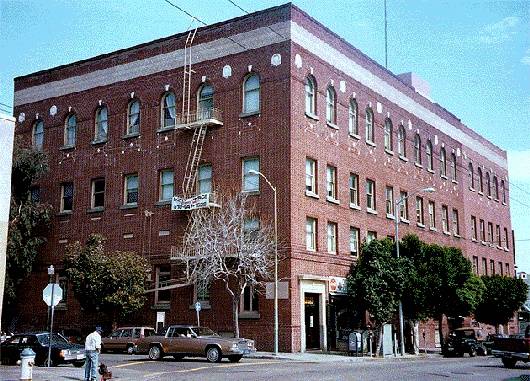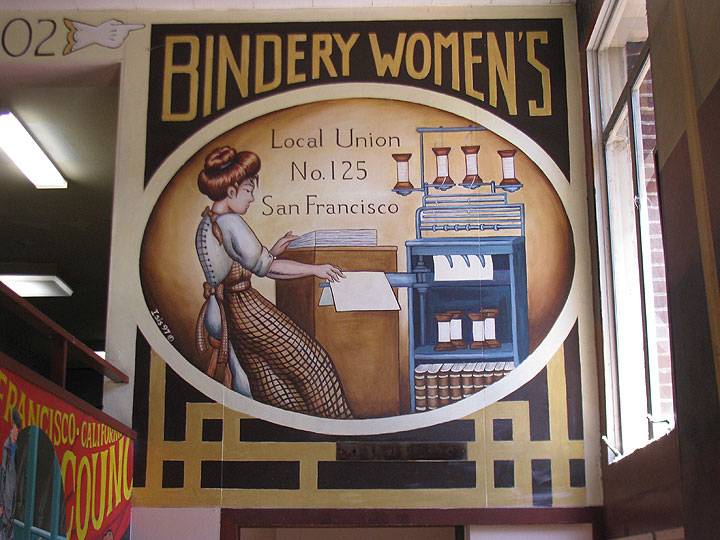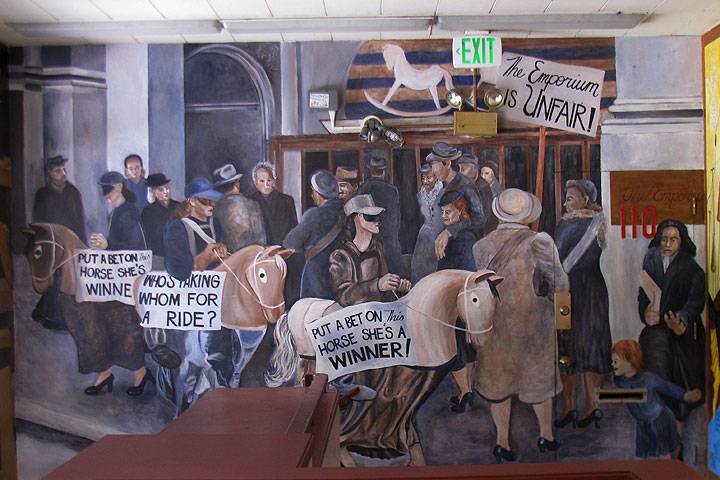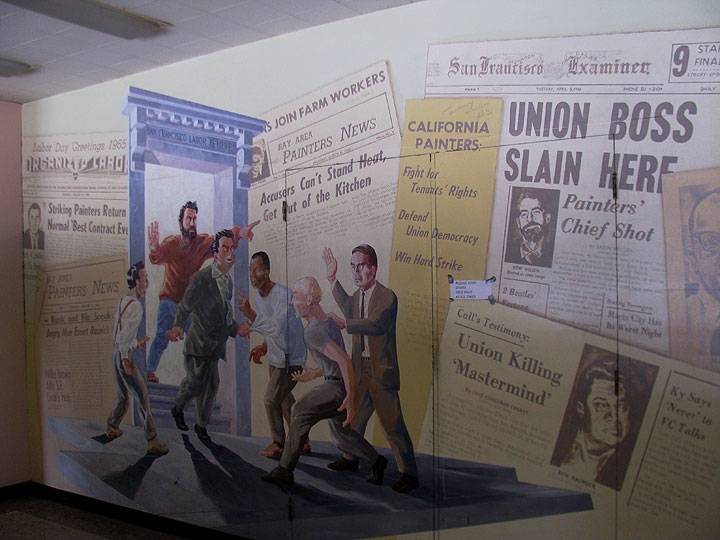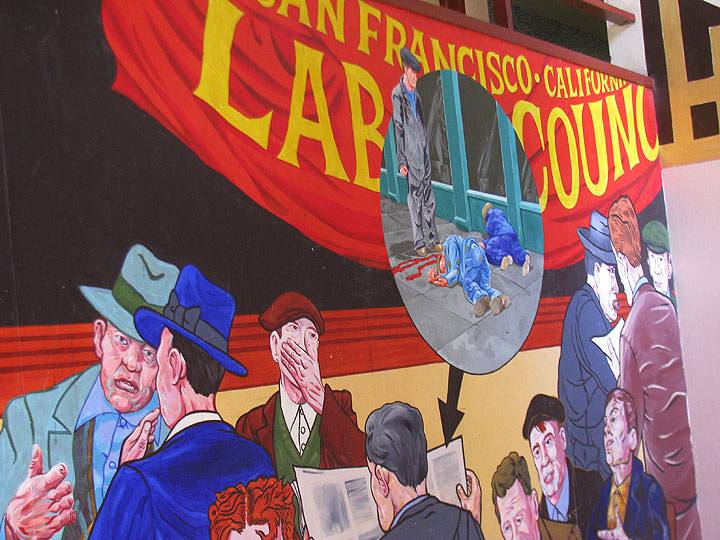Labor Temple: Redstone Building Murals: Difference between revisions
(added some history of building) |
EvaKnowles (talk | contribs) (added info from Molly & Bernal History Project) |
||
| (2 intermediate revisions by one other user not shown) | |||
| Line 1: | Line 1: | ||
[[Image:05.gif|64px|left]] [[Image:Bending-over-backwards-icon.jpg|100px|right]] '''Listen to an audio description of the Labor Temple that once filled the Redstone Building, part of the "Bending Over Backwards" walking tour:''' | [[Image:05.gif|64px|left]] [[Image:Bending-over-backwards-icon.jpg|100px|right]] '''Listen to an audio description of the Labor Temple that once filled the Redstone Building, part of the "Bending Over Backwards" walking tour:''' | ||
<iframe src=" | <iframe src="https://archive.org/embed/Stop516th.AndCapp" width="500" height="30" frameborder="0" webkitallowfullscreen="true" mozallowfullscreen="true" allowfullscreen></iframe> | ||
[http://archive.org/download/Stop516th.AndCapp/Stop%205-%2016th.%20and%20Capp.mp3 mp3] | [http://archive.org/download/Stop516th.AndCapp/Stop%205-%2016th.%20and%20Capp.mp3 mp3] | ||
| Line 24: | Line 24: | ||
''Photo: Chris Carlsson'' | ''Photo: Chris Carlsson'' | ||
The Redstone Building, also known as the Redstone Labor Temple, was formerly called "The San Francisco Labor Temple." It was constructed and operated by the San Francisco Labor Council Hall Associates. Initial planning started in 1910, with most construction work done during 1914. Its primary tenant was the San Francisco Labor Council, including 22 labor union offices as well as meeting halls. The building was a hub of union organizing, work activities, and a primary center for the city's historic labor community for over a half a century. | The Redstone Building, also known as the Redstone Labor Temple, was formerly called "The San Francisco Labor Temple." It was constructed and operated by the San Francisco Labor Council Hall Associates. Initial planning started in 1910, with most construction work done during 1914. It was dedicated on September 7, 1914 by former San Francisco mayor and head of the local Building Trades Council P.H. McCarthy. Its primary tenant was the San Francisco Labor Council, including 22 labor union offices as well as meeting halls. The building was a hub of union organizing, work activities, and a primary center for the city's historic labor community for over a half a century. A May 1916 Union Directory had 54 unions using the building for their meetings. The bakers and bakery wagon drivers, the bindery women, blacksmiths, butchers, carriage and wagon workers, cigar makers, coopers, horseshoers, ice and milk wagon drivers, janitors, sail makers, and tailors all met at the Labor Temple. | ||
The Redstone building played a significant role in the [[United Railroads Streetcar Strike 1917|1917 United Railroads streetcar strike]] as well as the [[1934 Big Strike|San Francisco Maritime strike]] that led to the 1934 San Francisco General strike for better working conditions for all workers. The Redstone has been designated San Francisco's 238th landmark. | The Redstone building played a significant role in the [[United Railroads Streetcar Strike 1917|1917 United Railroads streetcar strike]] as well as the [[1934 Big Strike|San Francisco Maritime strike]] that led to the 1934 San Francisco General strike for better working conditions for all workers. The Redstone has been designated San Francisco's 238th landmark. | ||
| Line 30: | Line 30: | ||
<font size=4>The Labor Murals</font size> | <font size=4>The Labor Murals</font size> | ||
Based on six months of historical research about the former San Francisco Labor Temple, headquarters of the Labor Council and home to the ''Labor Clarion'' newspaper and numerous locals from 1914 to 1968, this twelve mural project includes six murals on labor themes, including the 1934 general strike, the organization of Chinese garment workers in 1938, the department store strikes of the early forties and the career of [ | Based on six months of historical research about the former San Francisco Labor Temple, headquarters of the Labor Council and home to the ''Labor Clarion'' newspaper and numerous locals from 1914 to 1968, this twelve mural project includes six murals on labor themes, including the 1934 general strike, the organization of Chinese garment workers in 1938, the department store strikes of the early forties and the career of [[Dow Wilson's Assassination: The Fight for Democracy in the Painters' Union| Dow Wilson of Painters Local 4]], who was assassinated in 1966. This mural was organized by the [http://www.meganwilson.com/related/clarion.php Clarion Alley Mural Project] with a grant from the Creative Work Fund. <br><br> | ||
[[Image:Redstone-mural-bindery-women 3895.jpg]] | [[Image:Redstone-mural-bindery-women 3895.jpg]] | ||
Latest revision as of 09:30, 4 September 2024
Listen to an audio description of the Labor Temple that once filled the Redstone Building, part of the "Bending Over Backwards" walking tour:
<iframe src="https://archive.org/embed/Stop516th.AndCapp" width="500" height="30" frameborder="0" webkitallowfullscreen="true" mozallowfullscreen="true" allowfullscreen></iframe>
voice: Patrick Simms
Next Stop on "Bending Over Backwards" tour
Unfinished History
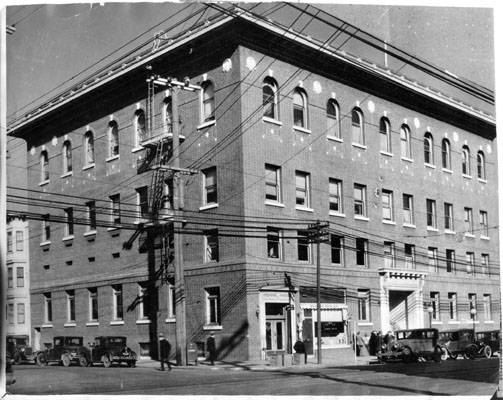
Labor Temple in 1929
Photo: San Francisco History Center, San Francisco Public Library
The Redstone Building at 16th and Capp Streets, 1997. For decades the Labor Temple, now home to numerous alternative political and arts groups, its lobby is adorned with a series of historic labor-theme murals.
Photo: Chris Carlsson
The Redstone Building, also known as the Redstone Labor Temple, was formerly called "The San Francisco Labor Temple." It was constructed and operated by the San Francisco Labor Council Hall Associates. Initial planning started in 1910, with most construction work done during 1914. It was dedicated on September 7, 1914 by former San Francisco mayor and head of the local Building Trades Council P.H. McCarthy. Its primary tenant was the San Francisco Labor Council, including 22 labor union offices as well as meeting halls. The building was a hub of union organizing, work activities, and a primary center for the city's historic labor community for over a half a century. A May 1916 Union Directory had 54 unions using the building for their meetings. The bakers and bakery wagon drivers, the bindery women, blacksmiths, butchers, carriage and wagon workers, cigar makers, coopers, horseshoers, ice and milk wagon drivers, janitors, sail makers, and tailors all met at the Labor Temple.
The Redstone building played a significant role in the 1917 United Railroads streetcar strike as well as the San Francisco Maritime strike that led to the 1934 San Francisco General strike for better working conditions for all workers. The Redstone has been designated San Francisco's 238th landmark.
The Labor Murals
Based on six months of historical research about the former San Francisco Labor Temple, headquarters of the Labor Council and home to the Labor Clarion newspaper and numerous locals from 1914 to 1968, this twelve mural project includes six murals on labor themes, including the 1934 general strike, the organization of Chinese garment workers in 1938, the department store strikes of the early forties and the career of Dow Wilson of Painters Local 4, who was assassinated in 1966. This mural was organized by the Clarion Alley Mural Project with a grant from the Creative Work Fund.
Isis Rodriguez’s illustration of the Bindery Women’s Local 125, which occupied the building in the early 1920s.
Photo: Chris Carlsson
Emporium Strike, by Susan Greene
Photo: Chris Carlsson
Aaron Noble’s piece illustrates two important moments in the City’s labor history—when the corrupt union official Ben Rasnick was thrown out of the Red Stone Building by Dow Wilson (depicted here); and, later, when Wilson was murdered by shotgun fire on April 5, 1966.
Photo: Chris Carlsson
Detail from Chuck Sperry's mural focusing on the 1934 strike.
Photo: Chris Carlsson


